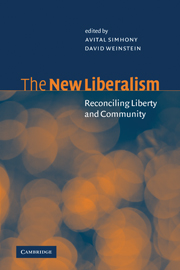Book contents
- Frontmatter
- Contents
- List of contributors
- Acknowledgments
- Introduction: The new liberalism and the liberal–communitarian debate
- 1 Liberal community: an essay in retrieval
- 2 T. H. Green on individual rights and the common good
- 3 T. H. Green's complex common good: between liberalism and communitarianism
- 4 Private property, liberal subjects, and the state
- 5 Neutrality, perfectionism, and the new liberal conception of the state
- 6 Bosanquet's communitarian defense of economic individualism: a lesson in the complexities of political theory
- 7 The new liberalism and the rejection of utilitarianism
- 8 Staunchly modern, non-bourgeois liberalism
- 9 The new liberalism and citizenship
- Select bibliography
- Index
7 - The new liberalism and the rejection of utilitarianism
Published online by Cambridge University Press: 06 July 2010
- Frontmatter
- Contents
- List of contributors
- Acknowledgments
- Introduction: The new liberalism and the liberal–communitarian debate
- 1 Liberal community: an essay in retrieval
- 2 T. H. Green on individual rights and the common good
- 3 T. H. Green's complex common good: between liberalism and communitarianism
- 4 Private property, liberal subjects, and the state
- 5 Neutrality, perfectionism, and the new liberal conception of the state
- 6 Bosanquet's communitarian defense of economic individualism: a lesson in the complexities of political theory
- 7 The new liberalism and the rejection of utilitarianism
- 8 Staunchly modern, non-bourgeois liberalism
- 9 The new liberalism and citizenship
- Select bibliography
- Index
Summary
Introduction
The new liberalism and nineteenth-century British utilitarianism were estranged conceptual cousins but they were conceptual cousins nonetheless. Indeed, they were deeply intimate members of an extended conceptual family despite their professed and inflated differences which analytical liberal theorizing in recent decades has only further inflated, as much because of its retrospective amnesia as anything else.
T. H. Green, L. T. Hobhouse, and D. G. Ritchie were pivotal figures in the making of the new liberalism. Yet, as we shall see, their reworking of nineteenth-century liberalism was much less than a thorough reworking. Their debt to British utilitarianism was considerably richer than is now commonly assumed. We should be unsurprised, then, if their respective versions of new liberalism turn out to be fundamentally consequentialist if not fundamentally utilitarian.
This chapter argues that the new liberalism of Green, Hobhouse, and Ritchie was fundamentally consequentialist. For all three, the good was self-realization requiring maximization in the sense of promotion. And for all three, maximizing self-realization fortunately also maximized happiness as well because self-realization and happiness were fused so intractably. Finally, for all three, self-realization was also a common good insofar as each person's self-realization fostered everyone else's, making the new liberalism also part communitarianism. The maximization of self-realization was nevertheless an authentically liberal goal insofar as it was distribution-sensitive by aiming at everyone's self-realization. And insofar as the pursuit of this goal was also constrained by respect for stringent moral rights, we have all-the-more reason to honor the authenticity of the new liberalism's liberal credentials.
- Type
- Chapter
- Information
- The New LiberalismReconciling Liberty and Community, pp. 159 - 183Publisher: Cambridge University PressPrint publication year: 2001



